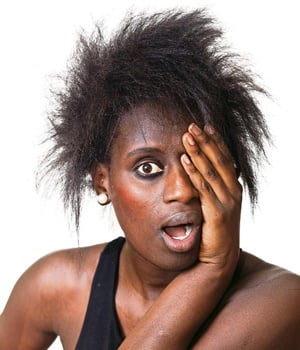
Every woman has a bad hair story, but many black women have pain associated with those stories. I’m still ashamed that at puberty I unleashed a torrent of expletives at my youngest cousin because she was trying to chat with me while my sister was combing relaxer into my coils.
What came out of my mouth were the kinds of ugly words I’d only heard said in English and by shebeen drunks.
I will not forget either how the same sister once singed my right ear with a curling iron. She swore it was a mistake, but I know to this day it was negligence.
Everybody knows that you fold the ear down firmly and exercise steely concentration when you have a curling tong to someone’s newly relaxed head.
The pain and politics of black hair aren’t only physical; they can also be emotional and psychological, as evidenced by Hugh Masekela in the personal story he shared in which he explains his distaste for women who wear weaves.
He was reflecting on an experience that black women, particularly, know intimately. Many of us grew up having a desire for limp, long, blonde hair that was so intense we’d prance around with a T-shirt or a mop over our heads. We’ve been ridiculed and abused by stylists at hair salons for daring to walk in with heads full of growth.
We spent Sunday afternoons locked between our impatient mother’s knees as they wrestled our “kaffir hare” into place so it would be acceptable for school. Even today, the question of what to do with a black girl’s hair can be a source of contestation for the adult womenfolk in a household for an entire weekend.
The history of black hair, especially in relation to women, has been about rules, restriction and submission. Though I can appreciate Masekela’s reasoning for wanting natural, African hair, and champion it myself, I hate his “I don’t appear in pictures with women with weaves”, because of the control he wants to exercise. Plus, it’s just mean and belittling.
It’s attempting to shame and bully grown women into black consciousness, and it squeezes “Africanness” into such a narrow definition it makes obvious its absurdities. What if I wear an Afro wig? Or blonde braids, as I do currently, which are also fake extensions? Will I pass judgement?
I hate also that it shows a lack of empathy for the burdens of history. Hair for some – not all, I admit – black women can be a survival issue, an economic and job imperative.
Take my cousin, for example. She works in a traditional white- and male-dominated industry in Cape Town and is a regular target of blatant racism from colleagues and clients, one of whom refused to shake her hand when he found out she was going to be taking over his account. She decided to go back to weaves after a year or so of having natural hair and says she felt a clear shift among her male colleagues, who softened towards her. She admitted that she wanted to stay protected under that version of feminine power.
As much as I don’t like weaves (it’s that strange mesh side-parting), I’m not going to disown her for it.
Men are a little too vocal about women’s hair choices. A well-known actress says men were the trolls who told her she looked unfeminine when she shaved her head.
To the random male strangers who’ve stopped me in the street to tell me they approve of my natural hair, I’ve always wanted to say: “Thanks for the compliment, but I don’t need a co-signatory.”
That goes for everyone, including the white girlfriend who said my braids suited me, but she really preferred my hair short ... and expected a fist bump.
I don’t have time, either, for natural hair movements that are judgemental. I don’t even submit to my own mother, who says I go around not combing my hair because I don’t know that it looks like worms.
I’m for the blogs that encourage enjoyment of our hair; that teach me new things and show me interesting styles for my curls. They bring to me a sense of ownership. Hair is political, but it’s also not, and in the many struggles we face, the one about what sits on our heads should have been won already.
Follow me on Twitter @joonji




 Publications
Publications
 Partners
Partners








